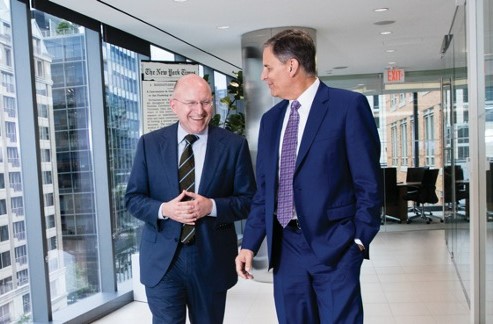Moret: When we talk about globalization and where manufacturers choose to make things, we often think of China or the lower cost countries as taking U.S. jobs because of cost. And that’s certainly been part of what’s happened.
But the other part that’s been really interesting is that over time, some of these shifts are less about low cost, but about the sheer availability of that technical workforce being greater in some other places. It’s something we’re trying to put more attention on in Virginia. And I think in general, the country, we could argue, needs to have a balanced focus in terms of post-secondary education.
Often, people think everybody needs to go to college, everybody needs a bachelor’s degree, right? But real workforce needs are a little bit more balanced with more sub-baccalaureate and bachelor’s together.
Timmons: I would agree with that. I think on your China point, and the point of investment outside the United States, a lot of that over the course of the last 20 years has been a result of an imbalance in tax and regulatory policy.
Over the last 18 months, manufacturers have argued successfully for a more competitive tax policy, one where we were not below average, or even just average. We’re above average now. We argued for regulatory certainty. We’ve been given both of those things by this administration.
Now, in my mind, manufacturers have an obligation. We made promises that if we got those things, we were going to invest in the United States, we were going to hire more American workers, we were going to raise wages and benefits. We’ve done all of those things. We would make sure that the air was cleaner, the water was cleaner, the environment was healthier. That’s on us. And we’re delivering and I’m really proud of manufacturers for doing that. Over the course of the last two years, we’ve had the best job creation in manufacturing that we’ve seen in a long time. You compare that to 2016, where there was actually a decrease in manufacturing jobs. The last two years, we’ve created almost half a million jobs in manufacturing.
Now, as we talked about earlier, we can’t fill all of those because we don’t have necessarily the folks with the right skills; we can’t find them. But it’s obviously a lot of great opportunity for manufacturers, and I think for Americans, because of the right policies.
Moret: As you talk to companies, are there particular occupations that come up frequently or types of skill sets that are concerns?
Timmons: I’ve tried to drill down on that, no pun intended, to find out exactly what it is folks are looking for. And what we get back oftentimes is it’s a whole range. You definitely will find a need for technicians; electrical, industrial maintenance and, certainly, welders and machinists. I don’t think the fact should be lost that manufacturing includes a lot of other jobs which might not be in folks’ minds considered traditional manufacturing jobs. You think of HR and marketing and accounting. We struggle to find folks for those jobs, too.
Those technical jobs seem to be the toughest because we have misalignment right now in our educational needs and system.
Moret: Certainly, when I’ve talked to the manufacturers, overwhelmingly it’s skilled positions that seem to be the dominant thing folks struggle with.
Timmons: No question about that. Just to be very blunt about it, manufacturers have a responsibility, too. It’s one thing to say we need more CNC machinists, but we need to help some of these community college or technical schools actually purchase some machinery to be able to have the students learn on the job, or perhaps bring them in as apprentices to our operations so they can learn and earn at the same time and get college credit for what they’re doing at work.
Moret: Considering the policy reforms that have been helpful that have been made recently, is the skills gap kind of the top of the list at this point?
Timmons: It is definitely at the top of the list. I would probably put concerns about trade as number two.
If you think in terms of North America, it’s vital for manufacturers that the USMCA gets ratified, and ratified soon. Uncertainty of any type is a concern for any business. For manufacturers who have to make investment decisions months, even years, in advance, it can be detrimental. And it can hold back a lot of investment and job creation. We don’t want to see that happen.
If you look at China — we talked a little bit about China and a lot of investment that occurred there. China’s big problem is, they steal.
They steal our intellectual property, they force localization. I mean, they cheat. It’s not the way we do business. It’s not the way a market economy does business.
I should add infrastructure is huge as well. We have called for a significant investment in infrastructure. We put out a proposal called Building to Win almost three years ago. It calls for over a trillion dollars of spending and it does what a lot of other proposals don’t do. It provides a lot of options as far as user fees that should be considered to actually pay for the needs we have. And you well know that a trillion dollars is only about half of the need out there. We’ve got a lot of needs in this country. And we’re way far behind our competitors.
Moret: Let’s shift gears just a little bit. As you think about economic competitiveness for manufacturing at the level of states, what are some of the things you see that state leaders should be doing to not only support their existing manufacturing base, but to be competitive for future manufacturing investment?
Timmons: Well, tax laws are always very important. The tax code of any state to the extent that localities are involved, that’s extraordinarily important. The regulatory environment is important as well. Certainty is critical. Making sure that those who invest in the state understand what the rules of the road are in the state. There’s nothing more disruptive to investment and job creation than having a sense of uncertainty. I think that can be done and should be done on a bipartisan basis.
I would throw in something else I know is controversial, but I think it’s absolutely vital to who we are as a country. I would like to see states speaking up about the importance of the immigrant community on their success as a state, their communities, and their workforce. If we have 500,000 jobs open in manufacturing, we have 7 million jobs open economy-wide. We have more jobs open today than we have Americans looking for jobs. That to me is an economic imperative.
I think that manufacturers, in particular, have a special role in leading a discussion on immigration reform. We put out a proposal called A Way Forward, and it takes on the economic imperative, the national security imperative, the humanitarian imperative. And we think it’s a workable program.
Immigration is important, not just for filling some of that workforce need we have, but really diversity and inclusion overall. Our manufacturers have found that the more diverse the workplace, the more productive we are and the more successful we are.
Moret: One thing we haven’t talked about yet is energy. What are some of the big issues right now from an energy perspective relative to manufacturing?
Timmons: Manufacturers use one-third of the nation’s energy output. Think about that; that’s a tremendous amount of energy we consume. So the cost of energy does matter if we’re going to be competitive as a country. The greater the mix of energy, the better our ability to contain the cost of energy.
We need to focus on expanding all types of energy production so we’re the most competitive we can be as a country.
Moret: In economic development, we often hear the term “advanced manufacturing” thrown around. But everybody seems to mean different things. I’m curious, if I say advanced manufacturing, is there a way to describe that, or is it more of a loose term?
Timmons: The way I would describe it is, if you survived the recession, you’re advanced manufacturing by definition. And I really, truly mean that, because you were forced to be as competitive as you possibly could be.
Moret: I realize there’s no way to pull out the crystal ball, but what are the big trends you see happening over the next five to 10 years in manufacturing?
Timmons: If you asked me that five years ago, I couldn’t have predicted what we’re seeing today.
I think the trends you’re going to see are more digitization, for sure. You’re going to see the importance of data more than ever. Robotics are going to become more and more important to the production process. But from a trend perspective, you’re going to need higher and higher skills for manufacturing workers. It’s why we pay more than any other sector of the economy on average, and it’s why we have this workforce skills gap and need for training of our workers.
For the full interview, visit www.vedp.org/Podcasts




